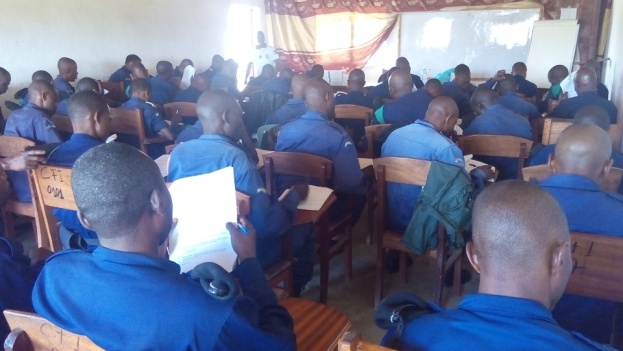Read the article as originally posted in Development Finance here.
The United Nations Police has concluded the latest in a series of HIV/AIDS workshops funded by MONUSCO, the UN body responsible for supporting the stabilisation of the Democratic Republic of the Congo, which have been designed to aid uniformed personnel in their efforts to curb the spread of HIV/AIDS within their ranks, and in key secondary cities.
The workshop, held at the National School of Police in the eastern city of Bunia, was administered by United Nations Police officials alongside five members of the Congolese National Police, and engaged over 500 male and female law enforcement officers between 27 April and 15 May 2015. It follows a recent seminar in the North Kivu capital of Goma, where officers were educated on HIV and AIDS, modes of transmission, stages of infection, treatment, and health centres that provide access to free support.
Training was also held in Bunia and Kisangani – the nation’s third largest urbanised city – in 2014, and the latest initiative is said to reflect a strong financial commitment to reducing transmission rates within high risk areas and groups, a statement issued by MONUSCO said. According to the national institution responsible for monitoring HIV/AIDS in the Congo, prevalence among uniformed staff has reached 7 percent, against a national average of just 1.1 percent. In Bunia, 4.5 percent of the city’s 350,000 population have been affected.
In addition to this, the Ministry of Gender, Family and Children reported that 21 percent of all cases of sexual violence are perpetrated by uniformed personnel, but that only 0.5 percent of female victims of rape have received judicial assistance, and MONUSCO medical physician Dr Charles Kisamba said that these indicators and the role police advocacy can make means providing training to local police offices is critical.
“At this stage we are only training the Congolese National Police and we cannot [yet] assess the outcomes in terms of financial [poverty reduction] benefits, but it is very encouraging to see the response we’ve received in Bunia,” said Kisamba. “A major new HIV/AIDS testing project will be set up over the coming few days in collaboration with the police force and local NGOs, and maintaining the momentum we have begun to build will be important.”
Before the end of the workshop, a demonstration on how to administer a ‘Post-exposure prophylaxis’ kit, the circumstances under which it should be distributed, and possible side effects of their use was explained. Post-exposure prophylaxis is a short-term antiretroviral treatment that can reduce the likelihood of HIV infection after potential exposure, either occupationally or through other means. Voluntary testing and counselling was also conducted in strict confidentiality during the seminar by the MONUSCO HIV/AIDS Unit in Bunia.
Bunia is home to one of the largest peace-keeping forces in Africa, and compliance with UN Security Council Resolution 1983, which encourages the inclusion of HIV/AIDS prevention, treatment, care and support in its peacekeeping mandates, was a recurring theme throughout the workshop.
Read the article as originally posted in Development Finance here.



